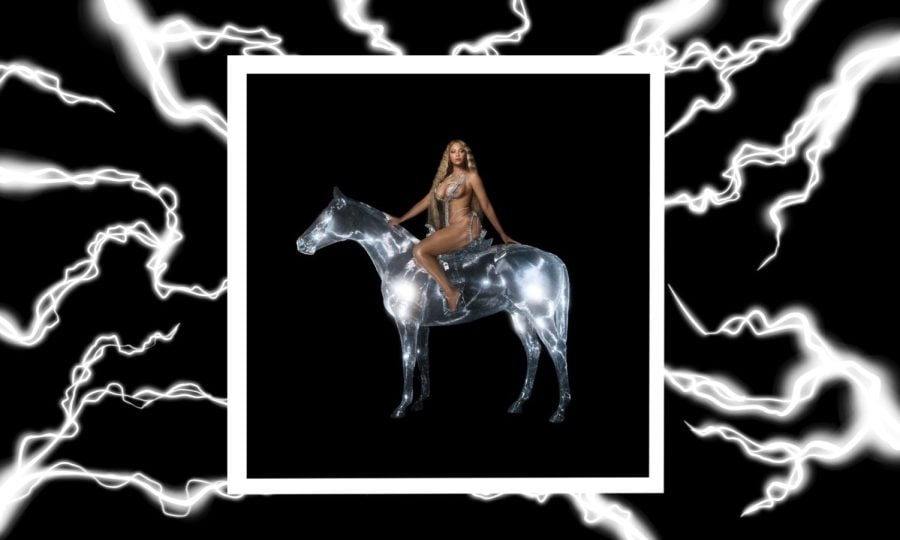Liner Notes: Beyoncé’s “Renaissance” builds a gender and sexually inclusive disco dreamland
Beyoncé’s “Renaissance” is a sociocultural rebirth as it is aptly named.
August 2, 2022
Renaissance: a cultural rebirth in every sense of the word. First coined by the French in the 14th through 17th centuries as a rediscovery of philosophy and artistry, the Renaissance opened the world to new and improved trains of thought. And Beyoncé’s new album, aptly named for this period, is fresh, funky and innovative — revealing a sense of renewed female empowerment completely distinct from her previous albums.
This new slate of music comes nearly a year after her last release of the soundtrack to “The Lion King” and three years after “Homecoming.” Though the bulk of the Texas native’s work exudes confidence and faculty, Beyoncé’s drama with Jay-Z — ranging from a cheating scandal to an elevator run-in with her sister Solange — may have added a new level of reactive “ENERGY,” as one of the songs is aptly named.
In fact, Beyoncé alludes to revenge in the outro of “CHURCH GIRL” through the words “Must be the cash ‘cause it ain’t your face.” The song starts with a soulful and melodic female voice that integrates well with rap throughout the song’s progression.
Almost all the pieces within “Renaissance” feature disco beats spiked with electricity. The disco-age of music might serve as a Renaissance all on its own, so Beyoncé’s ability to combine that with modern-day bodily autonomy not previously accepted in as many communities as it is today is prominent.
“ALIEN SUPERSTAR,” takes on a robotic, almost extraterrestrial jig with the words “Please remain calm. Do not attempt to leave the dancefloor,” sampled from Foremost Poet’s 1998 “Moonraker” at the start. Lyrics like “I’m too classy for this world” and “supernatural love up in the air” pose self-love as an out-of-body experience — an astute aspect of her album I personally enjoyed.
One of the shorter songs on the album, “ENERGY” is perfectly crafted for a night out. It features American-Jamaican rapper BEAM, with the opening words “On stage, rockin’, I’m star crazy.” He comes back throughout with the chorus word “energy” while Beyoncé sings about champagne, gold links and raw denim to reflect a club atmosphere.
But the album’s youth and grandeur isn’t just for listener pleasure; “Renaissance” mentions drug use in “AMERICA HAS A PROBLEM,” which samples from Kilo Ali’s 1990 single that describes Cocaine’s hold on the dealer industry. Beyoncé says, “Call me when you wanna get high” repeatedly during the song and states “Your ex-dealer dope, but it ain’t crack enough.”
In an interview with Vanity Fair, Jay-Z mentioned his drug-dealing past and said although he has never taken cocaine, he recognized his previous positionality in the epidemic. Though the song primarily connects drugs with sex and love, I’d argue that Beyoncé’s relationship with Jay-Z and ensuing knowledge of the drug industry develop’s this song’s message into something deeper. Others, however, have drawn a simpler lyrical analysis from “AMERICA HAS A PROBLEM” despite its somewhat political title.
Both “VIRGO’S GROOVE” and “SUMMER RENAISSANCE” reverberate a sense of unbridled sexual freedom that can only be summed up by ’70s disco and black queerness. It turns out that Black, trans icons like TS Madison and Honey Dijon are referenced in lyrics throughout this album — representing a payment of homage to the community itself.
Beyoncé explicitly sings “I need more nudity and ecstasy” in “VIRGO’S GROOVE,” a piece that exemplifies open-minded, sexual connection.
Of course, “SUMMER RENAISSANCE” is the album’s feature piece. The main chorus pulls from Donna Summer’s 1977 hit single “I Feel Love.” The artist sings “It’s so good” on repeat, which Beyoncé takes on almost completely in the main lines of the song with a slight minor key change.
If you’re looking for a funky step into the past — but also into a world much more appreciative of differing gender and sexual identities — listen to “Renaissance.”
Email: [email protected]
Twitter: @swarthout_iris
Related Stories:
— Liner Notes: Conan Gray returns with sophomore album ‘Superache’
— Liner Notes: Harry Styles delivers romantic, personal third album
— Musician of the Week: Singer-songwriter Ava Earl learns to smell the roses with her latest album












